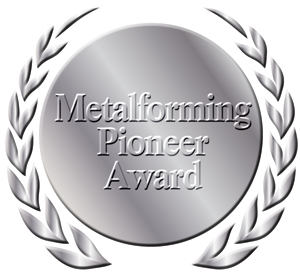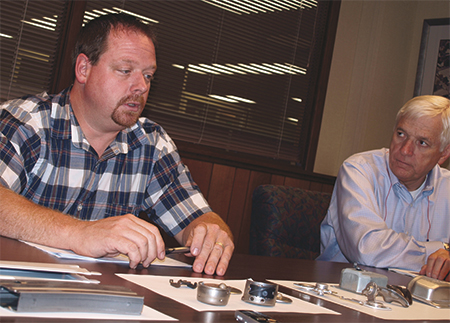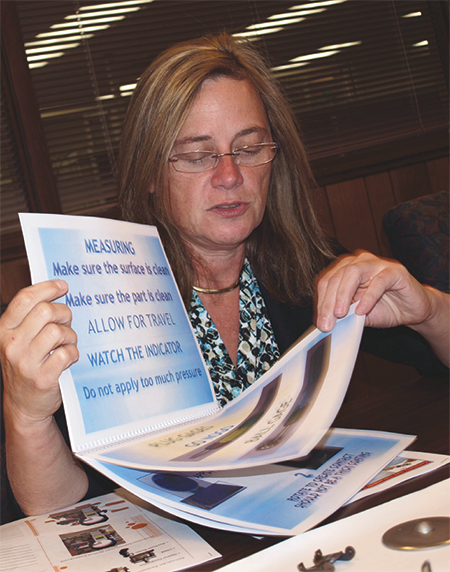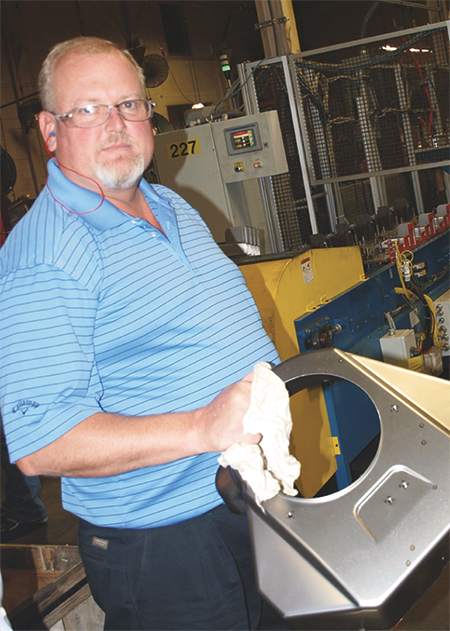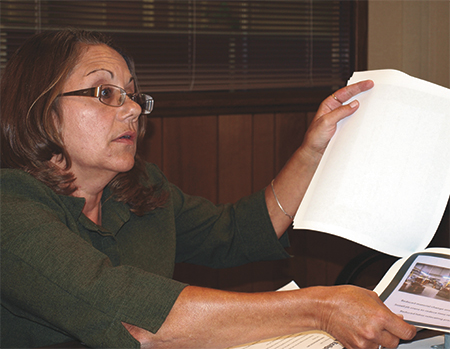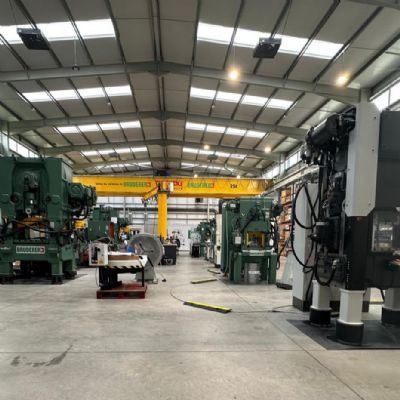Quality—Expecting More from the Operators
Eclipse operates out of a 130,000-sq.-ft. plant housing 35 stamping presses, including three multi-strip programmable presses performing very complex (and award-winning) in-die assembly. Inhouse value-added processes include powder coating, assembly, resistance welding and robotic arc welding. Twenty percent of its products are exported to China, Mexico, Eastern Europe and Thailand.
Quality training, under the direction of quality manager Nicole Robinson, received renewed focus in 2011 when the firm decided to retrain every one of its operators in core quality activities. “As a self-directed workforce, every operator is responsible for quality,” says Robinson, who worked previously as a CMM operator and then as a quality engineer and PPAP technician.
In addition to the rigorous quality classes Robinson has set up (a basic course attended by four operators at a time, and a followup advanced class attended by two at a time), she has compiled specific quality-process instructions in what are called Manufacturing Drawing Control Plans (MDCPs). The basic-training regimen covers gauges, calibration tags, caliper and micrometer do’s and don’ts, while the advanced class zeros in on use of more complex devices such as optical comparators, hardness testers and CMMs. “We spend a lot of time working through the various error messages and how to get out of them,” says Robinson. “And we provide PowerPoint handouts with a lot of photographs and illustrations to try to make the process failsafe.”
Lean = Reduced Process Variability
To understand how lean and quality training have supported management’s goals and initiatives, we spoke with plant manager Dick Reese. Reese took the plant’s reins late in 2010 and brought with him expertise in lean manufacturing gleaned from several years leading a large residential and commercial water-filtration manufacturing plant. At a relatively small plant such as Eclipse, lean, for Reese, means focusing on shortening lead times to improve reaction time —emphasizing continuous improvement on longer-term activities rather than on short-term kaizen events. It also means reducing process variability. “As we accomplish this,” he says, “we develop more consistent and predictable processes, which leads to efficiency gains and direct financial benefits to the company.
“We’ve sent three groups, of about 10 employees each, through a six-course training program at LTC,” continues Reese, “and intend to train others as they express interest. As these cross-functional teams of trained employees bring back what they’ve learned to the plant, they take on projects identified by our steering committee as offering the best opportunities to impact quality, costs, delivery and safety. We’ll have as many as four active lean teams at any one time, and we track each project for generated savings.”
In 2011, the Eclipse steering committee captured 26 opportunities for cost improvement, and weighted them based on impact vs. ease of implementation. The firm’s three lean teams then went to work. One project had a lean team focus on a critical press and new coating line serving a few of Eclipse’s newest and biggest customers. The team’s action items focused on improving the line’s throughput and quality, and included installing a new PLC to the press, adding a conveyor to move stamped parts to the coating line and implementing new scrap chutes. The projects returned a savings of more than $2000/month.
A key participant in Eclipse’s lean teams has been labor Grade 1 press operator and setup technician Perry Dekker. “Working on that critical press, the team focused a lot of energy on setup-time reduction,” he says. “Since 2010 when the team really started to make an impact on efficiencies here, we’re much more responsive to customers and able to minimize the downstream impact of any hiccups on the floor, ensuring we continue to meet customer expectations for quality and delivery.”
“For one customer, we’ve seen a 12-percent efficiency gain,” adds Reese, “and for another customer efficiency has improved 21 percent. And, overall we’ve significantly reduced scrap from that press line due to automating the parts handling between the press and the coating line.”
Growing Leaders Who are “Fair, Friendly and Firm”
Since 2010, following the closing of its Tennessee plant and the movement of 160 dies and five presses north to Wisconsin, Eclipse has hired and trained 20 new employees, expanding its labor pool to 50. At the same time, under the guidance of HR director Cindy Ellis, it has flattened its labor grades, offering Grade 4 as entry level up to Grade 1, which includes machine-setup capabilities. To progress through the labor grades, operators must learn certain, specific skills and are graded on those skills by their supervisor. Wages increase accordingly.
“Since 2009,” says Ellis, “we’ve promoted 20 percent of our labor pool through classification posting opportunities. And at the management level, we’ve promoted another 10 percent of our associate workforce into management positions. For example, a maintenance employee (Dave Magritz) was promoted in 2010 to first-shift production supervisor, and a material-handling associate (Stuart Free) was promoted early in 2012 to shipping-receiving supervisor.”
First-shift supervisor Dave Magritz, who worked for 12 years in the Eclipse maintenance group before moving into management, is quick to cite the lean training, as well as supervisory-management training, for his rise in the company ranks. He participated in the first group to undergo lean training at Eclipse. And, to prepare him for management responsibilities (Magritz oversees 24 direct and indirect employees), Eclipse had him attend courses at MRA—The Management Association, a not-for-profit employers association with four Midwest locations, including one in Waukesha, WI.
Magritz’s work in the maintenance department proved vital to developing one of the firm’s core competencies—multistrip stamping and in-die assembly, which earned Eclipse its 2011 PMA Product Design Award. As work leader in one of the firm’s multi-strip rooms, Magritz helped develop the process to the point where production could take it over from the maintenance and toolroom departments.
“That’s a very complex process,” he says, “where as many as 86 stations from four coil feeds produce four parts simultaneously in a single progressive-die press.
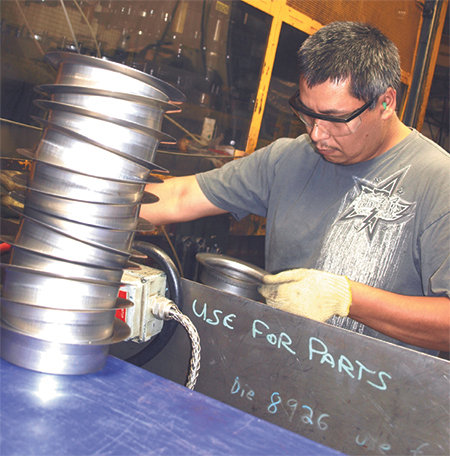 |
| Press operator and setup technician Eduardo Alvarez exemplifies Eclipse’s emphasis on motivating its self-directed workforce to take responsibility for product quality. “It’s my job to keep our customers happy,” says Alvarez, “by providing quality parts on time. So I go out of my to keep an eye on the supplier scorecards management puts together, for our key customers. That I can keep track of how we are doing, and understand how what I do fits into the overall picture.” |
“While at MRA,” Magritz continues, “I learned several types of management and communication skills, how to motivate people and deal with issues.” His course load at MRA comprised twice-weekly classes for 10 weeks. “Before attending the classes, I knew I had the knowledge and aptitude to manage, but I needed to learn how to use my skills to motivate people and get the results we were looking for. I’ve become, I believe, fair, friendly and firm, to keep everyone working hard toward a common goal.”
How has bringing his management style and acumen to the shop floor paid off? “Our shift is more of an intertwined group now,” Magritz says, “with a great deal of communication amongst the employees. This has made it much easier and more efficient to work through challenges. The production workers help each other without my intervention, and our more experienced employees mentor those less-experienced. At first I would get called over to help with every little issue. Now I can spend my time on more meaningful projects.”
Another production-floor worker promoted into management is Stuart Free, who walked into Eclipse in 1989 as a forklift driver, moved into powder coating in the mid-’90s, and was tapped to be shipping and powder-coat supervisor early in 2012. When we visited Eclipse late in 2012, Free was enthusiastically awaiting his opportunity to enlist in the same MRA Supervisor Training series of which Magritz speaks so highly.
Free supervises four employees in shipping and as many as seven (depending on work load) in powder coating. His focus has been to “find s for them to do their jobs better,” Free says. “Communication is the key, I believe. I try to keep everyone informed about the work coming today, tomorrow and for the days ahead, so they can plan and think ahead. We want to keep moving and eliminate any idle time.”
Meet Press Operator and Setup Technician Eduardo Alavrez
After 18 months on the job, Eduardo Alvarez rose from a labor Grade 3 to Grade 1, having leapt at every on-the-job training opportunity provided on what plant manager Dick Reese calls “our most critical press. Eduardo stepped right into that hot spot,” Reese says, “and has flourished.”
Alvarez, whose family moved to the United States from Mexico 23 years ago, “als speaks up if the training he’s receiving isn’t enough,” Reese continues. “He pushes our managers and the mentors working with him on the floor to learn more and identify areas where he can make an impact, by expanding just beyond press operations. For example, he’s asked for and has received extra training in press controls.”
For his part, Alvarez says: “It’s my job to keep our customers happy, by providing quality parts on time. So I go out of my to keep an eye on the supplier scorecards that management receives from our customers and posts on the shop-floor bulletin boards. That I can keep track of how we are doing, and understand how what I do fits into the overall picture. As a production team on the shop floor, this helps us focus on performance as a team and as a company, beyond how we function just as individuals.
“Being part of a team, working toward common goals,” Alvarez continues, “has been much more rewarding to me and led to a much improved lifestyle compared to my previous experiences working in manufacturing, where everyone seemed to work for themselves, kept to themselves and therefore didn’t really contribute to the overall health of the company.” MFView Glossary of Metalforming Terms
Technologies: Stamping Presses, Training







